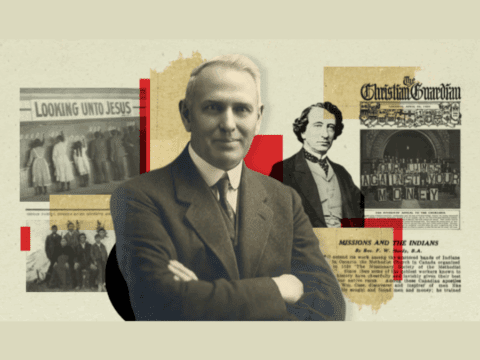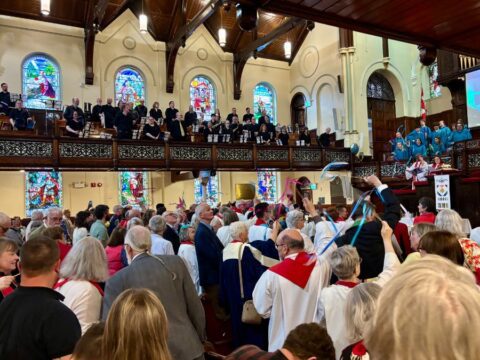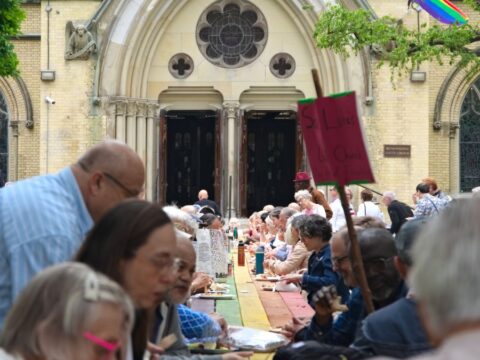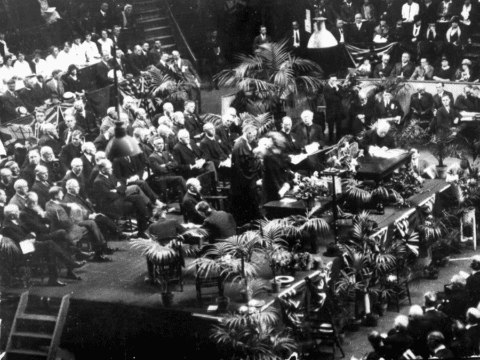Former parishioners and regular readers were taken aback last September when Bob Ripley — who had retired five years earlier from Metropolitan United in London, Ont. — revealed in his weekly syndicated newspaper column that he had changed his mind.
Once the theologically conservative pastor of what was Canada’s largest United Church congregation, Ripley wrote that he no longer believes in God, the Bible or “the doctrines of Christianity” and that “religion, all religion, is man-made.”
His book, Life Beyond Belief: A Preacher’s Deconversion, was published the same week and explains his loss of faith in more detail. What happened in the following months to Ripley — and to another active United Church minister who calls herself an atheist — raises questions about whether the denomination can or should monitor its ministers’ beliefs and challenge any seen to be crossing doctrinal boundaries.
A week after Ripley’s declaration, it was his turn to be taken by surprise. In a registered letter, London Conference executive secretary Rev. Cheryl-Ann Stadelbauer-Sampa implied that Ripley’s declaration had caused “heartache” for his former congregations and “damage to the identity of the denomination.” She invited him to request that his name be placed on the voluntary Discontinued Service List, which would remove him from the United Church’s ordered ministry.
“The speed with which the letter came . . . kind of shook me a bit,” Ripley said. Still, he complied and filled out the forms. His request was accepted, and he was told he can no longer use the honorific title “Reverend” and must refer to himself as a “former” rather than a “retired” United Church minister.
“I never wanted to cause any problems,” said Ripley. “I never wanted people to be upset or sad.” For her part, Stadelbauer-Sampa said her invitation was appropriate. “If you no longer believe in God, then you really can no longer live out the vows of an ordered minister that start with ‘I believe in God.’ . . . We are a people who are defined by our belief in the Divine.”
The oversight and discipline of ministers is normally a Presbytery’s job, but London Conference has taken over that work in a pilot project of General Council’s Effective Leadership and Healthy Pastoral Relationships program. Stadelbauer-Sampa emphasized that her letter to Ripley was an invitation, not a request or command. Asked what might have happened had Ripley refused, she declined to speculate: “I’m not going down that rabbit hole.”
In January, Rev. Gretta Vosper, minister of West Hill United in Toronto, was also invited to resign by one of her clergy colleagues.
Vosper is one of the United Church’s best-known and most controversial ministers. Her 2008 book With or Without God makes the case that churches should be more welcoming to “those who either do not believe in the supernatural elements of religion or do believe but do not feel we can make absolute, universal claims about it.” Her congregation’s visioning statement says, “We embrace theists, agnostics and atheists.”
Never shy about weighing in on the value of getting God out of religion, Vosper posted an open letter to United Church Moderator Rt. Rev. Gary Paterson online last January in response to a prayer on the United Church website addressed to “Gracious God,” written in the aftermath of religiously motivated killings at the Paris offices of Charlie Hebdo magazine.
Vosper wrote that belief in “the existence of a supernatural being” was behind the shootings and that if “our moral framework is dependent upon that supernatural being, we allow others to make the same claim . . . even if their choices and acts are radically different from our own.”
Retired Vancouver minister Rev. David Ewart fired back on his blog, calling Vosper’s ideas about God “juvenile and unbelievable.” He asked her to admit “she is no longer in accordance with the church’s understanding of her ordination vows” and to “take the steps to leave the United Church.” In an interview, Ewart said, “We are a church that supports a wide range of conversations and ideas, but typically we are affirming that there is something else beyond mere material reality, something more than the eye can see.”
Vancouver Sun religion writer Douglas Todd and Winnipeg Free Press columnist John Longhurstpiled on in the days that followed, quoting Ewart and calling on Vosper to leave the ministry.
Vosper and West Hill United ran into more flak in March after renting space from Applewood United in Mississauga, Ont., for a satellite site. When it was reported in The Observer’s February issue that Vosper indicated Applewood was open to West Hill’s approach, the congregation’s executive committee cancelled the rental agreement, and the chair wrote a letter to the editor affirming Applewood’s belief in God and the New Creed.
Vosper admits her comments can be provocative. But she sees changing the church’s understanding of God as part of her mission. As for resigning, she has no plans to do so. Vosper is far more pastoral and caring in person than her often confrontational public persona. As long as the members of her congregation are happy with her leadership, she is unlikely to be forced out.
If Vosper seems to be alone in her declaration of atheism, she is not alone in her lack of belief. More than 600 clergy of various denominations in Canada and the United States belong to The Clergy Project, an anonymous online support group for “active and former religious leaders who have moved beyond faith and who no longer hold supernatural beliefs.” Vosper is on the board and Ripley was an online member.
No question, United Church of Canada doctrine includes belief in God, but the details are bedevilling. The 2012 General Council affirmed — after a church-wide vote — that church doctrine includes the 1925 Basis of Union and 20 Articles of Faith, the 1940 Statement of Faith, the 1968 New Creed and the 2006 Song of Faith. Ministers are required to be in “essential agreement” with the Articles of Faith, where God is described, in part, as “the Lord Almighty” who is worshipped “in the unity of the Godhead and the mystery of the Holy Trinity.”
The New Creed describes a God “who has created and is creating, who has come in Jesus, the Word made flesh, to reconcile and make new, who works in us and others by the Spirit.”
The Song of Faith takes a metaphorical turn, saying, “God is Holy Mystery, beyond complete knowledge, above perfect description,” seen as “Creator, Redeemer, and Sustainer / God, Christ, and Spirit / Mother, Friend, and Comforter / Source of Life, Living Word, and Bond of Love.”
That leaves plenty of leeway, God-wise, but to add some interpretive fog, the church’s statements are “subordinate” or secondary to scripture, according to United Church doctrine.
Ordination vows, to stay in line with ecumenical partners, ask, “Do you believe in God, Father, Son and Holy Spirit and do you commit yourself anew to God?” The answer must be “yes” or “I do,” but Conferences take various steps to buffer the traditional language. Maritime Conference, for example, notes that “vows are exchanged in the presence of Creator, Redeemer and Sustainer and within the community of Maritime Conference,” while London Conference candidates reply affirmatively, adding words from the New Creed.
Whatever they promise, says Rev. Bill Steadman, chair of General Council’s theology and inter-church inter-faith committee, ministers are not subjected to any ongoing “test of faith” but rather must demonstrate accountability through Presbyteries (or Conferences under recent pilot projects). He says church courts are supposed to “check in on the health and well-being of both the ministry and congregation,” a process that “in my understanding, would probably include some sort of discussion about issues of faith.”
Steadman, a minister at St. Andrew’s United in Sudbury, Ont., says the church also has no clear definition of heresy — generally understood as deviation from established beliefs or church doctrines. “Lots of people, I think, express what we traditionally call an agnostic viewpoint, which is, ‘I’m not sure I have all the answers about this.’ Well, is that heresy or honesty?”
In proclaiming themselves atheists, Ripley and Vosper express certainty about the non-existence of God. But many other United Church ministers and congregations, while stopping short of that declaration, are moving away from traditional understandings of the Divine.
The Canadian Centre for Progressive Christianity, which Vosper helped to found, has a mailing list of about 1,000, including 100 or so ministers from various denominations. One of the group’s aims is to “examine traditionally held beliefs and practices, acknowledging the human construction of religion.”
In the wake of Ripley’s revelations, Rev. Paul Browning of Trinity United Church Community Centre in London, Ont., wrote in a congregational newsletter that most United Church ministers are beyond believing that “God is in control of everything and that only Christians are God’s children. . . . For me, the universe is Divine and we share in that divinity, the greatest power of which is the power of selfless love. . . . That glorious Mystery is my God.”
At Central United in Moncton, N.B., also home to the Community Peace Centre, Rev. James R. MacDonald says, “I struggle today with remaining open to mystery, but not allowing mystery to be reduced to a person-like identity with human-like characteristics who responds to our wish lists.”
Rev. Nancy Steeves, minister at Southminster-Steinhauer United in Edmonton, says, “It might be time for us to be asking what ‘essential agreement’ means in the 21st century, where the reality is not about church union but about a whole way of giving expression to what we mean by ‘church.’”
If the church wants such a discussion, says Steadman, General Council could ask the theology committee to delve into the nature of God, in light of current and evolving understandings. “It’s been over 20 years since we’ve done studies on the lordship of Jesus and the authority and interpretation of scripture,” says Steadman. “We need something else now to clearly understand where we are, [given that we’re] moving into . . . the second century of The United Church of Canada, which is coming in 10 years’ time.”













